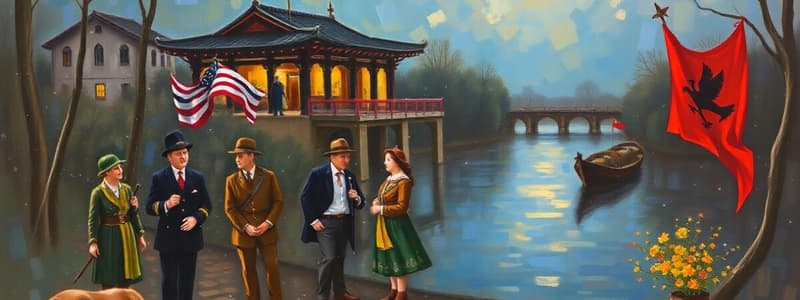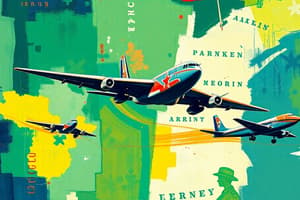Podcast
Questions and Answers
What two nations fought in the Korean War?
What two nations fought in the Korean War?
The United States and North Korea
What was the reason the Vietnam War was considered an indirect conflict between the US and Soviet Union?
What was the reason the Vietnam War was considered an indirect conflict between the US and Soviet Union?
- The Soviets were directly involved in the war, fighting alongside North Vietnam.
- The two sides, the US and the Soviets, were direct participants in the war.
- The US was fighting the war against the Soviets in Vietnam.
- Each nation and their allies supported one side of the Vietnam conflict. (correct)
The Korean War ended with North Korea becoming communist.
The Korean War ended with North Korea becoming communist.
True (A)
The Vietnam War ended with North and South Vietnam being united as a communist nation.
The Vietnam War ended with North and South Vietnam being united as a communist nation.
What is the name of the Canadian Forces program that is a joint collaboration with the US?
What is the name of the Canadian Forces program that is a joint collaboration with the US?
The Suez Canal Crisis marked the closest the US and Soviet Union came to a nuclear war.
The Suez Canal Crisis marked the closest the US and Soviet Union came to a nuclear war.
What was the initial role of the Canadian military during the Korean War?
What was the initial role of the Canadian military during the Korean War?
Flashcards
Korean War
Korean War
A war fought between North and South Korea from 1950 to 1953.
Vietnam War
Vietnam War
A war fought from 1955 to 1975, mainly between North and South Vietnam.
Cuban Missile Crisis
Cuban Missile Crisis
A 1962 confrontation between the US and the Soviet Union over Soviet missiles in Cuba.
Suez Canal Crisis
Suez Canal Crisis
Signup and view all the flashcards
UN intervention
UN intervention
Signup and view all the flashcards
Cold War
Cold War
Signup and view all the flashcards
Canada's peacekeeping role
Canada's peacekeeping role
Signup and view all the flashcards
NORAD
NORAD
Signup and view all the flashcards
Canadarm
Canadarm
Signup and view all the flashcards
space race
space race
Signup and view all the flashcards
Middle Power
Middle Power
Signup and view all the flashcards
Korean communist government
Korean communist government
Signup and view all the flashcards
Soviet occupation
Soviet occupation
Signup and view all the flashcards
UN Peacekeeping Force
UN Peacekeeping Force
Signup and view all the flashcards
Canadian Military
Canadian Military
Signup and view all the flashcards
Cold War Cooperation
Cold War Cooperation
Signup and view all the flashcards
Cuban Missile Crisis
Cuban Missile Crisis
Signup and view all the flashcards
Study Notes
Major Events in the Cold War
- Korean War (1950-1953): Conflict between North and South Korea, with involvement from the US and Soviet Union. Before WWII, Korea was ruled by Japan. After WWII, Soviets occupied the North and US the South. The North Korean leader wanted to invade the South. The UN sent troops to defend the South.
- Vietnam War (1955-1975): Indirect conflict between the US and the Soviet Union. Each nation supported their respective allies (North Vietnam/Soviet Union vs South Vietnam/US). It was a democracy vs communism war. In the end North and South Vietnam unified under communist rule.
- Cuban Missile Crisis (October 1962): The closest the US and Soviet Union came to nuclear conflict during the Cold War. The Soviets placed nuclear missiles in Cuba. US discovered this and placed a naval blockade around Cuba. An agreement was reached to de-escalate the situation.
- Suez Canal Crisis (1859): French company tried to build canal connecting the Red Sea and the Mediterranean. Egypt's Nasser took over canal, Israel, Britain, and France tried to regain control but failed.
Canada's Participation
- Korean War: Canada participated by sending peacekeeping forces under UN resolution to support the South.
- Vietnam War: Canadian government did not participate directly but deployed peacekeeping forces in 1973.
- Cuban Missile Crisis: Canada was threatened if the US and Soviet Union went to war because of proximity but avoided conflict.
- Suez Canal Crisis: Lester Pearson, Canada's minister of external affairs, was instrumental in finding a peaceful resolution, creating the UN Emergency Force (UNEF) to prevent further conflict.
Additional Details
- Canadian military contributions in proportion to population,
- Involvement in international operations,
- Efforts to promote freedom and maintain world peace.
- Canada acted as a mediator in some cases.
- Canadian corporations offered support to the US by selling war materials for example.
- Over 26,000 Canadians served in American forces during the Korean War.
Studying That Suits You
Use AI to generate personalized quizzes and flashcards to suit your learning preferences.




